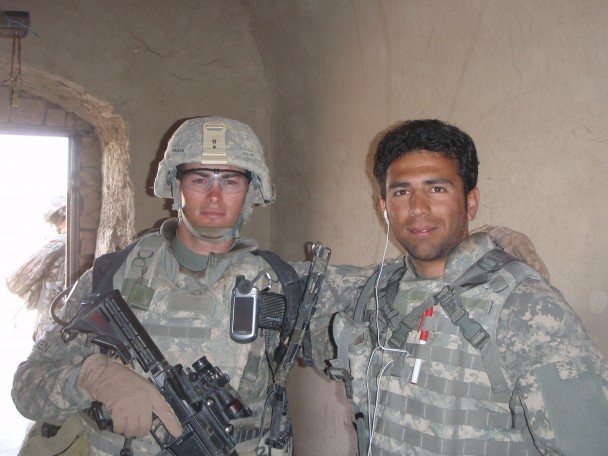Zazay the Interpreter

Recently, an email came through which referred to the Afghan Allies Protection Act. This was a measure that was led by Iowa Senator, Joni Ernst. Now, I don’t care what your political leanings are, but this is a great measure that will most likely go fairly unnoticed. The bill will expedite efforts to improve and increase the number of visas extended to Afghans who assisted the U.S. during the War on Terror. It will increase the number of authorized visas by 8,000, which is quite a substantial amount.
This measure is personal for me as I worked with a few different interpreters while serving in Afghanistan. We would execute daily patrols into villages throughout Kandahar, and as the leading element, I was typically making the first contact with locals. Because of this, I wanted to have a solid knowledge of the language and culture. The region that I was in (Kandahar Province, Maiwand District) the dialect and culture was that of the Pashtun tribes. After taking a twenty-hour course, I then took the time to study with the interpreters while others were Skyping with their families or taking a nap. Soon, I was able to converse up to a certain point, and I was even asked by a local if I was the interpreter. Not bad for a white boy from Butler County, Iowa. This would oftentimes get me invited into many homes (mud-huts) for shai (tea). Even with that momentum, there was still much that I was missing. Obviously, my novice language skills only got me along for a minute or two, so I needed an interpreter to guide me through many conversations. Then, the important aspect of this was that body language is much different there than it is in the United States. These are people who have experienced war in their backyards for decades. They have different mannerisms and ticks that we as Americans have a difficult time picking up on.
The interpreter that I worked with most was named Zazay. He was from Kabul, and he spoke English very well. We formed a good relationship and he even brought me back a gift from his home while he went on leave. Zazay would openly call out when somebody was lying to me. He would relay my questions, but he would also dig on his own, based upon the response that he received. I would ask something like, “What are you doing out here watching our patrol with a radio?” Zazay would ask him, and then continue asking him questions without me knowing what he was talking about. He would then let me know that the guy said the radio was for reaching his family. He would go on, “so I asked him if he had a phone, and he said yes. Then I asked him where he lived; he pointed to the village nearby. So, I asked him why he needs a cell phone and a radio to reach his family that only lives down the road. He had no response.” Zazay was good.
He tried to teach me as much as he could about how people react over there. I soon started picking up on these traits and it was confirmed many times when Zazay turned to me and yelled, “This guy is a (bleeping) liar!” Yes, he knew all of our special words. The fact is that Zazay helped us capture some bad guys and quite possibly saved our lives a couple of times, as he didn’t miss some things that we would otherwise dismiss as normal. He told me more than once how he was excited to move to the United States, and I always told him he would be welcome in my home. After returning home and getting caught up in the way we live here, I never spoke to him again. I have asked around, but have not heard anything about him, other than a rumor. The rumor was that he was caught by the Taliban, and executed for helping the United States. I don’t know if that’s true, but if it is, it’s a sad shame.
Having worked with the International Rescue Committee, I know that it can be a long wait for people like this to make it to the United States. This new bill can help save some lives. And as far as I’m concerned, these are lives of people who served our country, and are risking more than we do. Not only will they be executed, but their families will be sought after as well. And for those of you worried about “bringing terrorists here”, use your brain a bit. The vetting process is quite extensive and these aren’t just random people taken off the street. Besides, it is far easier to catch a bad guy when he is in your backyard, so if somebody does slip through the cracks, it will not take long to figure that out. So, I commend Iowa Senator Joni Ernst for leading this measure, and I hope this little write-up helps with understanding why it is important.
Category:
Tribune-Journal & Star
101 N. Main St.
P.O. Box 788
Clarksville, IA 50619
Phone: 319-278-4641
Mid-America Publishing
This newspaper is part of the Mid-America Publishing Family. Please visit www.midampublishing.com for more information.
